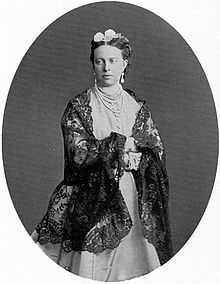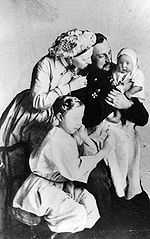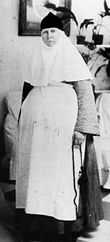Duchess Alexandra Petrovna of Oldenburg
| Duchess Alexandra | |
|---|---|
| Grand Duchess Alexandra Petrovna of Russia | |
 | |
| Spouse | Grand Duke Nicholas Nikolaievich |
| Issue |
Grand Duke Nicholas Nikolaevich Grand Duke Peter Nikolaevich |
| House |
House of Holstein-Gottorp-Romanov House of Holstein-Gottorp |
| Father | Duke Peter Georgievich of Oldenburg |
| Mother | Princess Therese of Nassau-Weilburg |
| Born |
2 June 1838 St. Petersburg |
| Died |
25 April 1900 (aged 61) Kiev |
| Religion | Lutheran upon marriage Eastern Orthodox |
Grand Duchess Alexandra Petrovna of Russia (Russian: Александра Петровна; 2 June 1838 – 25 April 1900) was a daughter of Duke Peter Georgievich of Oldenburg and a great granddaughter of Emperor Paul I of Russia. She married Grand Duke Nicholas Nikolaevich of Russia (1831–1891), the elder, and was the mother of Grand Duke Nicholas Nikolaevich of Russia (1856–1929), the younger. After the breakup of her marriage, she retired from court life and eventually became a nun.
Early life
Alexandra Petrovna was born on 2 June 1838, in St. Petersburg as Duchess Alexandra Frederika Wilhelmina of Oldenburg. She was the eldest of the eight children of Duke Peter Georgievich of Oldenburg and his wife Princess Therese of Nassau-Weilburg, half-sister of Sofia of Nassau, queen consort of Oscar II of Sweden. Alexandra belonged to a German family but grew up in Russia,[1] where her family was closely related to the Romanov dynasty.
Duke Peter Georgievich of Oldenburg, Alexandra’s father, was the only surviving son of Grand Duchess Catherine Pavlovna, the fourth daughter of Tsar Paul I of Russia. Peter of Oldenburg followed a military career in the Imperial Russian Army and was also a scholar and philanthropist. Alexandra Petrovna grew up in the happy Oldenburg family. Peter Georgievich and his wife led an exemplary family life, and looked carefully after the education of their children. The family spent the winter months in Peterhof and moved for the summer to their other residence Kamenoi-Ostroff.[2] Alexandra’s education awoke in her an interest in medicine and in solving social problems of the poor.
Marriage
Alexandra’s parents arranged a high-status marriage for her. On 25 October 1855, she was engaged to Grand Duke Nicholas Nikolaevich, the third son of Tsar Nicholas I and her first cousin once removed. Alexandra, who had been raised in the Lutheran church, converted to the Orthodox faith on 7 January 1856, and was styled as: HIH Alexandra Petrovna Grand Duchess of Russia. The wedding took place on 6 February 1856, in Peterhof. Her first son was born nine months later in their ground floor apartment of the Winter Palace.[3] In December 1861, the couple moved to their newly built Nicholas Palace on Annunciation Square where, in 1864, Alexandra gave birth to a second son and last child. By then her marriage had started to fall apart.
Alexandra was plain and unsophisticated. She liked simplicity and preferred to dress modestly, avoiding public life. She dedicated her time to religion and to her consuming interest in medicine. She was also a gifted painter.[4] Alexandra was not beautiful, but her sincerity and pleasant manners made her win many sympathies. She was well liked by her two sisters-in-law Maria Alexandrovna and Alexandra Iosifovna. At first, her husband took her ideas seriously and financed a hospital in the city where Alexandra’s theories could be developed and put into practice and poor patients received care without charge. Sometimes she nursed them herself. Eventually, she founded a training institute for nurses in St Petersburg.[5]

By the late 1860s, their marriage was in trouble. The couple had found out that they had little in common. Lacking in looks and social graces, she preferred to stay away from Court functions. This annoyed her husband, who also complained of her plainness and the modesty of her dress. Converted to the Russian Orthodox church when she married, she became extremely pious. Alexandra was a serious woman whose passions were religion and medicine.
The couple’s palace in St. Petersburg was so large that they did not have to see each other. They appeared together only in official ceremonies. Eventually Nicholas Nikolaevich developed a permanent relationship with Catherine Chislova, a dancer from the Krasnoye Selo Theater. The Grand Duke did not attempt to hide his affair. In 1868, Catherine Chislova gave birth to the first of the couple’s five illegitimate children.
By 1870, nothing was left of her marriage except the bitterness.[3] Resentment was the only response she could offer to her husband's unfaithfulness. Alexandra spent longer and longer periods in Kiev while her husband divided his time between his children with Alexandra and his second family. When the Grand Duke arranged a change of class into the gentry for his mistress and the couple’s illegitimate children, Alexandra Petrovna appealed to Alexander II to intervene, but she found her brother-in-law less than sympathetic. "You see," he bluntly told her, "your husband is in the prime of his life, and he needs a woman with whom he can be in love. And look at yourself! See even how you dress! No man would be attracted".[6] After this encounter, however, Alexander did advise the Grand Duke to be more discreet and exiled Catherine Chislova to Wenden, near Riga.
According to some sources, Alexandra Petrovna retaliated against her husband's infidelity by taking a lover and, in 1868, gave birth to an illegitimate son. However, no sound information has surfaced to corroborate these claims. The story of the illegitimate child seems unlikely.[4]
Last years

In 1880, Alexandra left St Petersburg for good to start a new life in Kiev. Initially, she lived at the Mariyinsky Palace, the Emperor's residence in Kiev, but retired later to a convent. However, she refused to grant her husband the divorce he would have wanted. Grand Duke Nicholas Nicolaievich hoped to survive his wife, as had been the case of his brother Alexander II who once a widower married his mistress. Alexandra, although not in good health, outlived both her husband and her husband’s mistress.[7] Catherine Chislova died in 1889, and Grand Duke Nicholas survived his lover for only two years. When he died in the Crimea in 1891, Alexandra Petrovna refused to attend the funeral. Even then, she did not forgive him. She also refused to pay homage to her death husband when the funeral catafalque, taking his body for burial in the St Peter and St Paul Cathedral in St Petersburg, came by train via Kiev on its route from the south.[8]
Alexandra became a nun as 'Sister Anastasia' taking Holy Orders on 3 November 1889 in Kiev, while her husband was still alive. She founded a convent of nursing nuns with its own hospitals, asylums and dispensary to provide free treatment for the poor. She dedicated her life to the work, which had always been her priority. She remained close to her sons, who had taken her side in the family break up. She was in the Crimea in 1898 when her daughter-in-law, Grand Duchess Militsa, gave birth to twin daughters, one of which died shortly after birth. Alexandra took her granddaughter’s remains with her and buried the coffin in the convent cemetery in Kiev.[9] Afflicted with stomach cancer, Alexandra Petrovna died at Kievo Pechersky Monastery in Kiev on 25 April 1900, when she was 61. Today her grave in the convent garden is again tended by nuns and her works continues.[1]
Children
Alexandra Petrovna was survived by her two sons:
- Grand Duke Nicholas Nikolaevich of Russia the Younger (1856–1929)
- Grand Duke Peter Nikolaevich of Russia (1864–1931)
Titles and styles
- 2 June 1838 - 7 January 1856 Her Imperial Highness Duchess Alexandra Petrovna of Oldenburg (Princess Alexandra Petrovna Oldenburgskaya)
- 7 January 1856 - 25 April 1900: Her Imperial Highness Grand Duchess Alexandra Petrovna of Russia
Ancestry
| Ancestors of Duchess Alexandra Petrovna of Oldenburg | ||||||||||||||||||||||||||||||||||||||||||||||||||||||||||||||||||||||||||||||||||||||||||||||||||||||||||||||||||||||||||||||||||||||||||||||||||||||||||||||||||||||||||||||||||||||||||||||||||||||||||||||||||||||||||||||||||||||||||||||||||||||||||||||||||||||||||||||||||||||||||||||||||||||||||||||||||||||||||||||||||||||||||||||||||||||||||||||||||||||||||||||||||||||||||||||||||||||||||||||||||||||||||||||||||||||||||||||||||||||||||||||||||||||||||||||||||||||||||||||||||||||||||||||||||||||||||||||||||
|---|---|---|---|---|---|---|---|---|---|---|---|---|---|---|---|---|---|---|---|---|---|---|---|---|---|---|---|---|---|---|---|---|---|---|---|---|---|---|---|---|---|---|---|---|---|---|---|---|---|---|---|---|---|---|---|---|---|---|---|---|---|---|---|---|---|---|---|---|---|---|---|---|---|---|---|---|---|---|---|---|---|---|---|---|---|---|---|---|---|---|---|---|---|---|---|---|---|---|---|---|---|---|---|---|---|---|---|---|---|---|---|---|---|---|---|---|---|---|---|---|---|---|---|---|---|---|---|---|---|---|---|---|---|---|---|---|---|---|---|---|---|---|---|---|---|---|---|---|---|---|---|---|---|---|---|---|---|---|---|---|---|---|---|---|---|---|---|---|---|---|---|---|---|---|---|---|---|---|---|---|---|---|---|---|---|---|---|---|---|---|---|---|---|---|---|---|---|---|---|---|---|---|---|---|---|---|---|---|---|---|---|---|---|---|---|---|---|---|---|---|---|---|---|---|---|---|---|---|---|---|---|---|---|---|---|---|---|---|---|---|---|---|---|---|---|---|---|---|---|---|---|---|---|---|---|---|---|---|---|---|---|---|---|---|---|---|---|---|---|---|---|---|---|---|---|---|---|---|---|---|---|---|---|---|---|---|---|---|---|---|---|---|---|---|---|---|---|---|---|---|---|---|---|---|---|---|---|---|---|---|---|---|---|---|---|---|---|---|---|---|---|---|---|---|---|---|---|---|---|---|---|---|---|---|---|---|---|---|---|---|---|---|---|---|---|---|---|---|---|---|---|---|---|---|---|---|---|---|---|---|---|---|---|---|---|---|---|---|---|---|---|---|---|---|---|---|---|---|---|---|---|---|---|---|---|---|---|---|---|---|---|---|---|---|---|---|---|---|---|---|---|---|---|---|---|---|---|---|---|---|---|---|---|---|---|---|---|---|---|---|---|---|---|---|---|---|---|---|---|---|---|---|---|---|---|---|---|---|---|---|---|---|---|---|---|---|---|---|---|---|---|---|---|---|---|---|---|---|---|---|---|---|---|---|---|---|---|---|---|---|---|---|---|---|---|---|---|---|---|---|---|---|---|---|---|---|---|---|---|---|---|---|---|---|---|---|---|---|---|---|---|---|---|---|---|---|---|---|---|---|---|---|---|---|
| ||||||||||||||||||||||||||||||||||||||||||||||||||||||||||||||||||||||||||||||||||||||||||||||||||||||||||||||||||||||||||||||||||||||||||||||||||||||||||||||||||||||||||||||||||||||||||||||||||||||||||||||||||||||||||||||||||||||||||||||||||||||||||||||||||||||||||||||||||||||||||||||||||||||||||||||||||||||||||||||||||||||||||||||||||||||||||||||||||||||||||||||||||||||||||||||||||||||||||||||||||||||||||||||||||||||||||||||||||||||||||||||||||||||||||||||||||||||||||||||||||||||||||||||||||||||||||||||||||
Notes
- ↑ 1.0 1.1 “ The Camera and the Tsars”, Charlotte Zeepvat, pg. 43
- ↑ “The Russian Oldenburgs”: David McIntosh, p. 372
- ↑ 3.0 3.1 “Patriots and Just Men”: Charlotte Zeepvat, p. 66
- ↑ 4.0 4.1 “ Djulber”, Charlotte Zeepvat, pg. 66
- ↑ “ The Camera and the Tsars”, Charlotte Zeepvat, pg. 66
- ↑ “Gilded Prism”: Greg King & Penny Wilson, p 40
- ↑ “The Romanov Legacy : The Palaces of St. Petersburg”: Zoia Belyakova, p.153
- ↑ “The Romanov Legacy : The Palaces of St. Petersburg”: Zoia Belyakova, p.140
- ↑ “ Djulber”, Charlotte Zeepvat, pg. 68
Bibliography
| Wikimedia Commons has media related to Alexandra Petrovna of Oldenburg. |
- Belyakova, Zoia, The Romanov Legacy : The Palaces of St. Petersburg, Hazar Publishing, 1994, ISBN 1-874371-27-X.
- King, Greg & Penny Wilson Gilded Prism, Eurohistory, 2006, ISBN
- McIntosh, David, The Russian Oldenburgs, in Royalty History Digest.
- Zeepvat, Charlotte, Patriots and just Men, in Royalty History Digest.
- Zeepvat, Charlotte, Djulber, in Royalty History Digest.
- Zeepvat, Charlotte, The Camera and the Tsars, Sutton Publishing, 2004, ISBN 0-7509-3049-7.
| ||||||||||||||||||||||||||||||||||||||||||
| ||||||||||||||||||||||||||||||||||||||